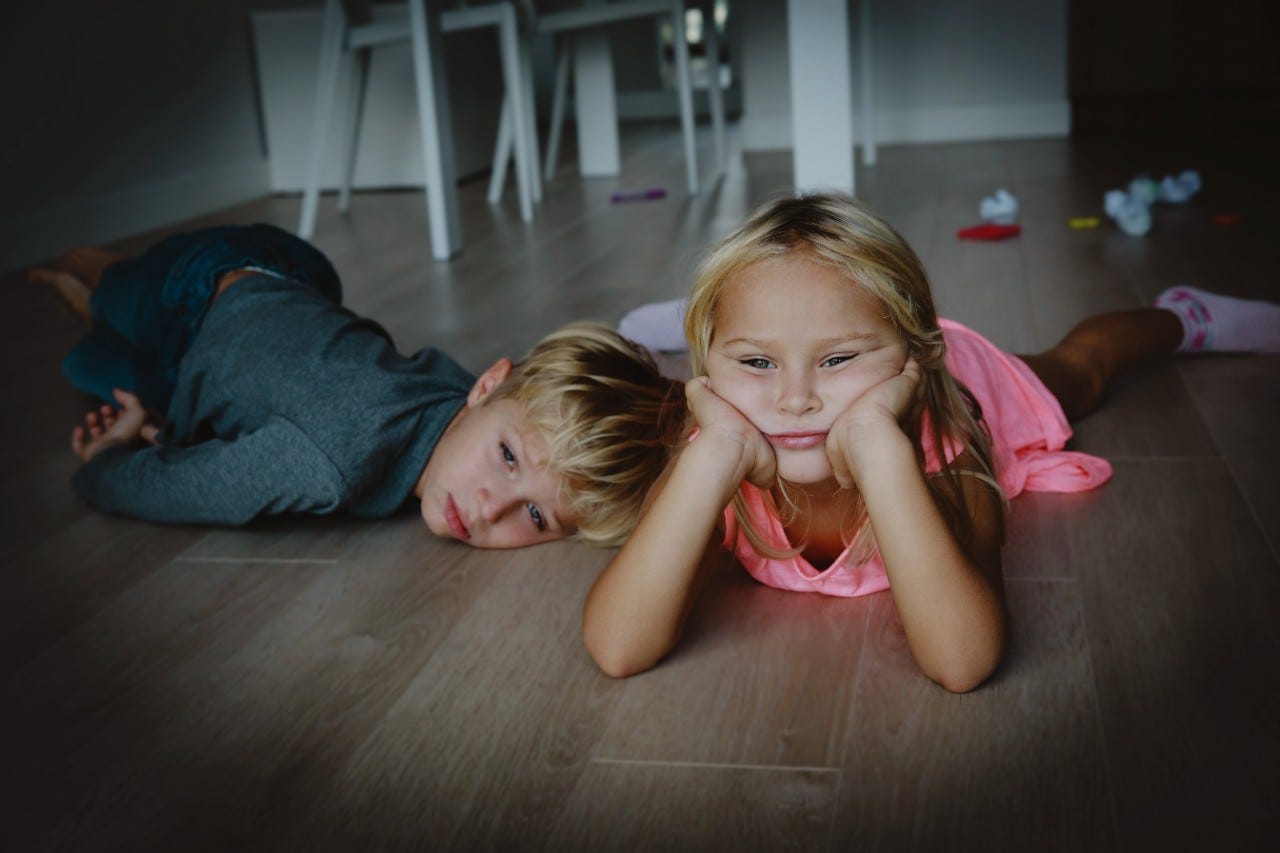Families in lockdown: I’m bored!
Schools and kindergartens are closed. All their friends are in lockdown too. Football fields are out of bounds, the homework’s done, and you’ve run out of ideas for making things. Boredom strikes! Why a healthy dose of boredom won’t do your kids any harm, and is actually good for them.

Psychologists Susanne Walitza and Simon Grunauer explain what boredom is and why, on balance, it’s a very positive state.
What exactly triggers boredom?
Simon Grunauer: Boredom is a complex phenomenon Scientists can’t agree on a common definition. Not only that, but it’s not clear why we humans get bored. Boredom is most often described as an unpleasant emotional state, possibly triggered by monotony and a lack of stimulation. It’s also assumed that a high level of sustained attention and concentration and a low level of motivation are factors favouring boredom.
Some parents have the feeling that their child complains a lot about boredom - or gets bored much more quickly than others. Are there really differences?
Simon Grunauer: Yes, children have different levels of activity. Some need a lot of different activities and rapidly move from one thing to the next. These kids can get bored quickly even if what they’re doing seems entertaining. Other children can keep themselves occupied with the same activity or toys for longer, even for hours on end. Personality traits such as introversion and extraversion also have a varying influence on the experience of boredom.
Is boredom also a question of age?
Simon Grunauer: Yes and no. Even really young children get bored. They can’t put their finger on or name the feeling so well, so they simply stop showing an interest, complain or even start crying.
“Boredom occurs again and again until adolescence - but the extent is very individual.”
depending on how many planned activities children and young people have. In later adolescence, boredom tends to get less common, because school is challenging and in our western culture it’s usual to seek distraction in leisure activities and consumption. Boredom appears to be more or less non-existent – or no longer allowed – once we reach adulthood: either because you could be seen as being lazy or you then have to find your own ways of handling the boredom.
Is boredom a sign of parental neglect? Is it even harmful for children?
Simon Grunauer: Boredom can be harmful for children who grow up in circumstances where they’re physically and/or emotionally neglected. But the opposite doesn’t apply: boredom doesn’t harm children who grow up in a good environment, unless they’re permanently underchallenged, which can prevent them from developing their potential.
What’s the best way for parents to respond if their kids complain of boredom?
Simon Grunauer: First of all you should accept what the child’s feeling, and maybe paraphrase it, for example: "Aha, don't you have any idea what you want to do now?" Then they can think together with the child about whether other feelings are involved, for example: "Could it be that you're annoyed because you don't know what to do?" Parents can respond by emphasizing the positive side of boredom by saying: “It looks like you’re having problems coping with being bored at the moment. But that also leaves room for new ideas!”
“Parents should try to steer their children towards coming up with new ideas themselves.”
And then they can talk to their child to find out how it could deal with boredom. It’s best not to simply list the hundred toys they have in their room. Parents should try to steer their children towards coming up with new ideas themselves.
Susanne Walitza: So it’s not just about leaving children to their own devices. In addition to doing activities together with them, it’s also about helping them to recognise the value of boredom.
But many people aren’t aware of this value and tend to constantly try and “entertain” their children. Is that a good idea, or can it also be counterproductive?
Susanne Walitza: There’s no one single answer to this question. Each family has to find its own way of balancing the needs of the parents and the children. What’s right for one family might not be so good for another. But children don’t need round-the-clock entertainment. They need periods without animation, free time, and also boredom.
We’d encourage parents to trust their intuition. Parents generally have a good feel for when it’s best to help kids come up with their own ideas, when it’s good to do something together, and when it’s best to leave their child to deal with being bored. It depends on the age of the children, their phase of development and their personality.
Why would you say boredom can benefit children?
Simon Grunauer: First of all, boredom is a good opportunity to practise being aware of yourself, your thoughts and your needs, and learning how to formulate them. It’s also something that’s helpful and healthy for adolescents and adults as well.
“If we try [...] to distract the child with activities, this distraction becomes a matter of course.”
Susanne Walitza: Boredom isn't a waste of time. Above all, by overcoming boredom a child can learn how to amuse itself and come up with ideas of things to do. By coming to terms with a feeling of being bored it learns to fill the void that appears, and also realises the value of activity and stimulus. If you try and distract your child with activities every time a feeling of boredom comes up, they’ll end up taking this distraction for granted. Through periods of boredom, by contrast, a child can develop an interest in topics and activities, and find meaning in ways of passing the time that can’t be prescribed by you.
Apart from this, boredom can be a good sign indicating calm and relaxation. It only sets in when children are under less stress and have fewer obligations and deadlines, for example at the weekend.
“It’s been observed that periods of boredom boost the performance of the brain.”
And there are various medical and psychological studies showing brain activity during phases of boredom. In other words, the brain is working even when it doesn’t have much to do. It’s been observed that periods of boredom boost the performance of the brain.
So with time, can children find their own way out of boring situations?
Susanne Walitza: Children who are familiar with the feeling of being bored also remember how they made use of previous situations where time seemed to go very slowly. They’ve developed trust in their ability to use these periods of drawn-out time. Children who don’t have much experience of dealing with boredom first have to experience this. But if we as parents treat boredom as a matter of course, place value on it and show our children that we trust their ability to deal with it, they too will develop this confidence in themselves.
Can parents take the easy way out and sit their child in front of the TV when they're bored?
Simon Grunauer: Yes, provided the programme, the game or the YouTube video doesn’t go on too long and is age-appropriate and geared to the child. But it’s often more fun for kids to watch a movie or play a game with their parents. This will also give the parents an idea of their children’s media competency. Rather than passive consumption it’s much better for kids to use digital media actively and creatively. For example, children could launch a video call with their grandparents, godparents or friends. They could use simple programs to make their own videos and soundtracks. There are also great apps for things like composing your own music or making a comic.


